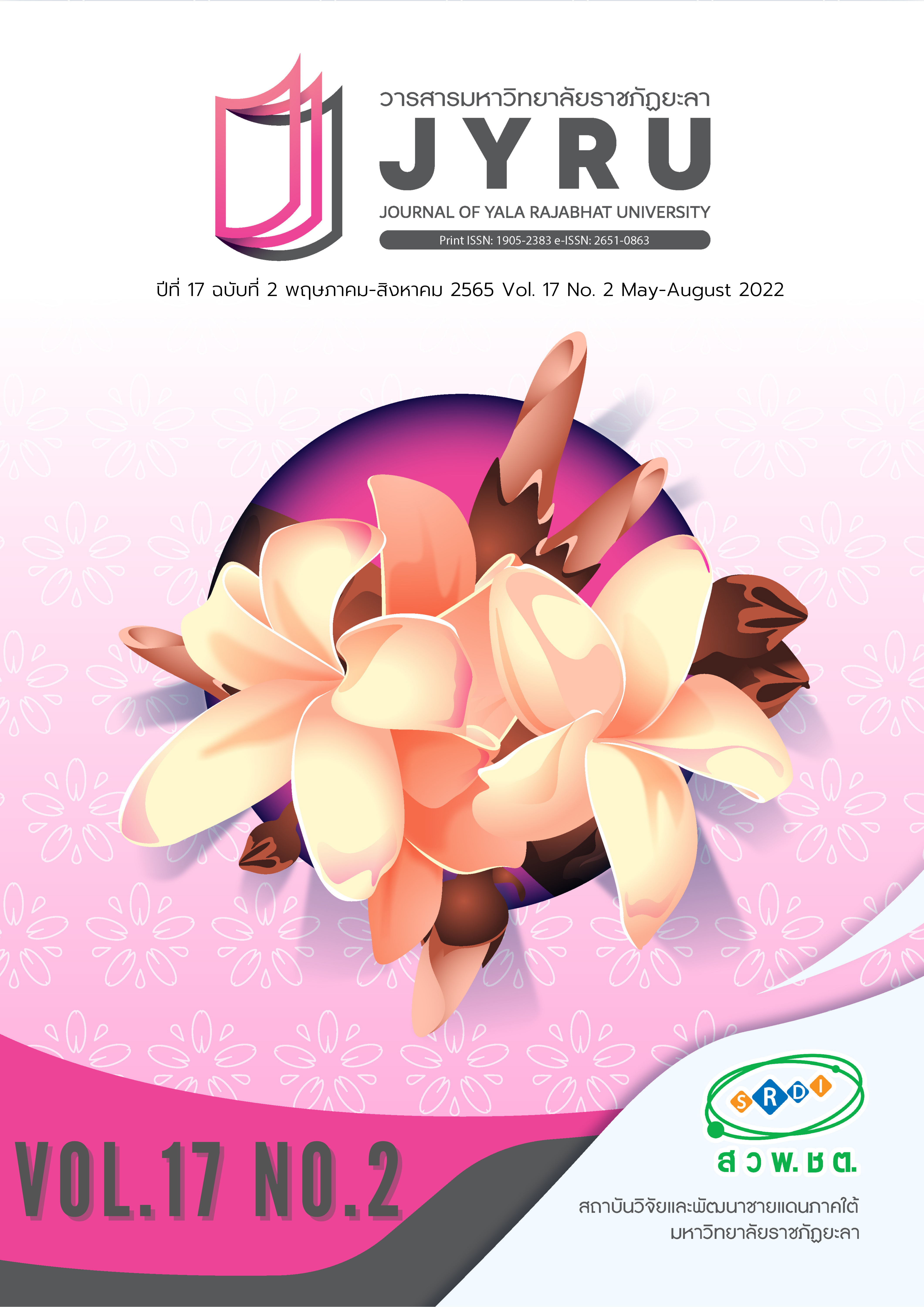การพัฒนาผลสัมฤทธิ์ทางการเรียนวิชาภาษาไทยเชิงบูรณาการ โดยใช้แนวคิดวรรณคดีเป็นฐานร่วมกับรูปแบบการจัดการเรียนรู้ตามแนวคิดจิตวิทยาเชิงบวก PERMA สำหรับนักเรียนชั้นมัธยมศึกษาปีที่ 3
Main Article Content
บทคัดย่อ
ปัญหาด้านการจัดการเรียนรู้และสุขภาวะของนักเรียน ส่งผลให้นักเรียนมีสภาวะเชิงลบและขาดแรงจูงใจในการเรียนรู้ ซึ่งเป็นปัจจัยสำคัญที่ส่งผลกระทบต่อผลสัมฤทธิ์ทางการเรียนของนักเรียน จึงวิจัยโดยมีวัตถุประสงค์เพื่อ 1) เปรียบเทียบผลสัมฤทธิ์ทางการเรียนก่อนและหลังการจัดการเรียนรู้เชิงบูรณาการ โดยใช้แนวคิดวรรณคดีเป็นฐานร่วมกับรูปแบบการจัดการเรียนรู้ตามแนวคิดจิตวิทยาเชิงบวก PERMA 2) เปรียบเทียบผลสัมฤทธิ์ทางการเรียนหลังการจัดการเรียนรู้เชิงบูรณาการ โดยใช้แนวคิดวรรณคดีเป็นฐานร่วมกับรูปแบบการจัดการเรียนรู้ตามแนวคิดจิตวิทยาเชิงบวก PERMA เทียบกับเกณฑ์ร้อยละ 80 3) ศึกษาความพึงพอใจของนักเรียนที่มีต่อการจัดการเรียนรู้ กลุ่มตัวอย่าง คือ นักเรียนชั้นมัธยมศึกษาปีที่ 3/1 โรงเรียนทุ่งเสลี่ยมชนูปถัมภ์ จังหวัดสุโขทัย ภาคเรียนที่ 2 ปีการศึกษา 2563 จำนวน 37 คน เครื่องมือที่ใช้ในการวิจัย ได้แก่ แผนการจัดการเรียนรู้ แบบทดสอบวัดผลสัมฤทธิ์และแบบสอบถามความพึงพอใจ วิเคราะห์ข้อมูลด้วยสถิติ ค่าเฉลี่ย ส่วนเบี่ยงเบนมาตรฐาน และสถิติทดสอบสมมติฐานโดยใช้ t-test ผลการวิจัยพบว่า นักเรียนมีผลสัมฤทธิ์ทางการเรียนสูงกว่าก่อนเรียนอย่างมีนัยสำคัญทางสถิติที่ระดับ 0.05 และมีผลสัมฤทธิ์ทางการเรียนสูงกว่าเกณฑ์ร้อยละ 80 อย่างมีนัยสำคัญทางสถิติที่ระดับ 0.05 ความพึงพอใจของนักเรียนที่มีต่อการจัดการเรียนรู้อยู่ในระดับมากที่สุด ผลการวิจัยอธิบายได้ว่าการเชื่อมโยงแนวคิดจิตวิทยาเชิงบวกกับการจัดการเรียนรู้วิชาภาษาไทย โดยนำเนื้อหาวรรณคดีมาเป็นแกนกลางในการเรียนรู้เป็นการบูรณาการความรู้ทางภาษาไทยและจิตวิทยาเชิงบวกที่สามารถพัฒนาผู้เรียนทั้งทางสติปัญญาและจิตใจ ช่วยเสริมสร้างสุขภาวะของผู้เรียนให้มีความสุขในการเรียนรู้ ส่งผลให้การเรียนรู้มีประสิทธิภาพสูงขึ้น
Article Details

อนุญาตภายใต้เงื่อนไข Creative Commons Attribution-NonCommercial-NoDerivatives 4.0 International License.
บทความ ข้อมูล เนื้อหา รูปภาพ ฯลฯ ที่ได้รับการเผยแพร่ในวารสารมหาวิทยาลัยราชภัฏยะลานี้ ถือเป็นลิขสิทธิ์ของวารสารมหาวิทยาลัยราชภัฏยะลา หากบุคคลหรือหน่วยงานใดต้องการนำทั้งหมดหรือส่วนหนึ่งส่วนใดไปเผยแพร่ต่อหรือกระทำการใดๆ จะต้องได้รับอนุญาตเป็นลายลักษณ์อักษรจากวารสารมหาวิทยาลัยราชภัฏยะลาก่อนเท่านั้น
เอกสารอ้างอิง
Archsattroo, S. (2016). Effect of instructional activities through literature Klon Dok Sroy Rumpoeng Nai Paacha integrating and a literature-based approach for Mattayomsuksa 2 students Suanboonyopathum Lamphun school. Journal of Graduate Research, 7(1), 43-58. (in Thai)
Jensen, E. (2020). Poor students, rich teaching: seven high-Impact mindsets for students from poverty, revised edition. (Wongkittithorn, T. & Ponpala, L., Translator). Bangkok: Bookscape. (in Thai)
Ketpan, P. (2018). Positive psychology and learning. [Online]. Retrieved April 4, 2020, from: https://www.facebook.com/pketumarn/posts/2330758660272170. (in Thai)
Ministry of Education. (2009). The basic education core curriculum B.E.2551. Bangkok: Agricultural Co-operative Federation of Thailand Ltd.
Ministry of Education. (2010). National education act. B.E. 2542 and amendments (the second version) B.E. 2545 and (the third version) B.E. 2553. [Online]. Retrieved September 10, 2020, from: http://www.atg.go.th/law-03.html
Onthanee, A. (2020). Perspectives on curriculum development through the national scheme of education B.E. 2560 - 2579. Journal of Education Naresuan University, 22(1), 366-380. (in Thai)
Pongpajon, C. (2019). Thai language arts learning unit design using a literature-based approach: concept, application and critical concerns. Journal of Manutsayasat Wichakan, 26(2), 95-125. (in Thai)
Pongpajon, C. (in press). Development of Thai literature learning management model based on positive psychology by using PERMA model and strength-based education for fostering well-being of secondary students. Journal of Social Sciences and Humanities. (in Thai)
Rujiganjanarat, K., Obhasi, S., Worasayan, W., Suksawang, P. (2020). Effect of learning style to academic achievement for Thai traditional medical students by happiness learning as a mediator. Silpakorn University Journal, 40(2), 50-61. (in Thai)
Thavorn, T., Pimroon, S., Thanoi, W. (2018). Correlated factors of psychological well-being among high school students. Journal of Nursing Science, 36(3), 59-70. (in Thai)
Thianlela, W. (2018). 24 key characters: Global education goals and the quality of life of the new generation. [Online]. Retrieved March 24, 2020, from: https://thepotential.org/knowledge/character-strengths/. (in Thai)
Thongking, P. (2020). The teacher’s role and creating a positive learning environment in the 21st century classroom. CMU Journal of Education, 4(1), 50-59. (in Thai)
Tuntivivat, S. (2017). Positive psychology: development, applications and challenges. Journal of Behavioral Science for Development (JBSD), 9(1), 277-290. (in Thai)


